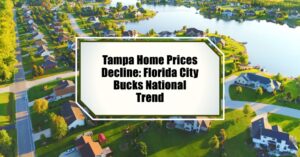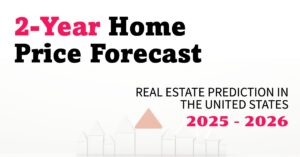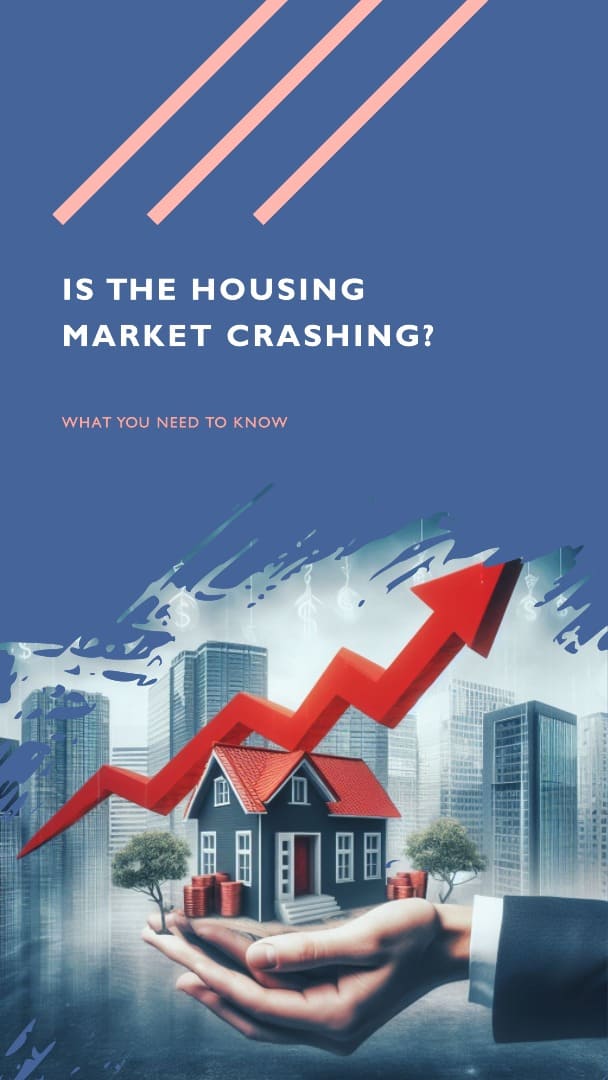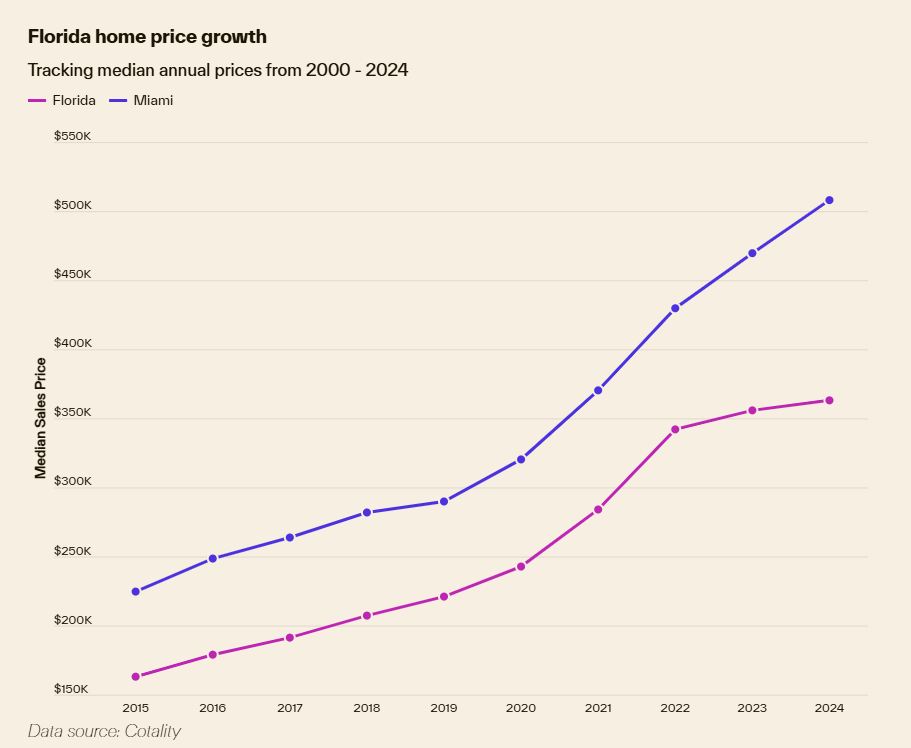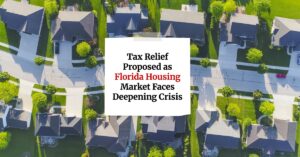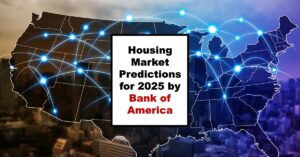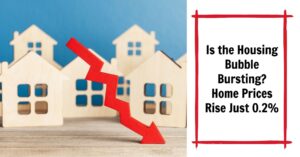Ever feel like the ground beneath the housing market is shifting? Well, in at least one Florida city, that feeling is becoming reality. You might be scratching your head, especially after years of seemingly relentless price hikes across much of the nation. So, let's get straight to it: housing prices are indeed falling in Tampa, Florida, marking it as a notable exception in a recent national snapshot of the real estate scene.
According to the S&P CoreLogic Case-Shiller Index data from February 2025, while most major U.S. metros saw continued price growth, Tampa experienced a 1.5% year-over-year decline. This news might bring a mix of emotions, depending on whether you're looking to buy, sell, or simply understand the dynamics at play. As someone who's followed housing trends for a while now, this development in Tampa definitely warrants a closer look.
A National Slowdown with a Local Twist
The broader context is important here. The same report highlighting Tampa's dip also indicated a general slowing of home price momentum nationwide. The annual increase in national home prices eased to 3.9% in February, down from 4.1% the previous month. Similarly, the 20 major U.S. metros tracked by the index saw a slightly smaller average gain. This suggests that the feverish pace of price appreciation we witnessed in the recent past is cooling off.
However, Tampa stands out because it's not just experiencing slower growth; it's seeing an actual decrease. This makes me think about the specific factors at play in this vibrant Gulf Coast city. What's unique about Tampa's market that sets it apart from places like New York City, which saw a robust 7.7% annual increase, or even other Florida markets that are still appreciating?
Tampa: This Florida Housing Market Bucks National Trend With Declining Prices
I believe several interconnected factors are contributing to this shift in Tampa's housing market. It's not likely to be one single cause, but rather a combination of market corrections and evolving economic realities.
- The Pandemic Boom and the Subsequent Correction: Like many Sunbelt cities, Tampa experienced a significant surge in housing demand and prices during the COVID-19 pandemic. The allure of Florida's climate, coupled with remote work trends, drew an influx of new residents. This rapid appreciation, in my opinion, was often unsustainable in the long run. What we might be seeing now is a natural market correction as demand normalizes and affordability becomes a greater concern.
- Affordability Challenges Catching Up: The Realtor.com analysis accompanying the Case-Shiller Index points to a crucial factor: affordability. Markets that saw the largest price increases during the pandemic boom are now struggling with slower growth, or even declines, because prices simply outpaced local incomes. I suspect this is a significant element in Tampa's situation. While it's still a desirable place to live, the rapid price escalation might have priced out a segment of potential buyers, leading to less competition and downward pressure on prices.
- Increased Housing Supply: While national inventory remains below pre-pandemic averages, the Realtor.com March inventory report noted a 28% year-over-year increase in active listings. If Tampa is experiencing a similar or even more pronounced increase in supply, this would naturally give buyers more options and potentially lead sellers to lower their prices to attract offers. It’s basic economics: more supply generally leads to lower prices, assuming demand remains constant or decreases.
- Cooling Buyer Demand: The report also touched on a broader trend of cooling buyer demand compared to the frenzy of previous years. This is likely influenced by factors like elevated mortgage rates, persistent inflation impacting household budgets, and increasing economic uncertainty. Nationally, consumer sentiment data in April showed a significant plunge in expectations about the future economy, and rising concerns about job security could be making both buyers and sellers more hesitant. If this sentiment is particularly strong in the Tampa area, it could further dampen demand and contribute to price declines.
- Regional Market Dynamics: Hannah Jones, Senior Economic Research Analyst at Realtor.com, highlighted that “the housing market varies significantly by region.” She noted that the “well-supplied South and West regions show signs of cooling,” while the “affordable Midwest and the less affordable Northeast housing markets continue to thrive.” Tampa, being in the South, aligns with this broader trend of cooling in regions that saw significant supply increases.
Personal Insights and My Take on the Tampa Situation
Having observed housing markets for some time now, I'm not entirely surprised by this development in Tampa. While the initial pandemic-fueled boom seemed like it would never end, fundamental economic principles always tend to reassert themselves. Unsustainable price growth, especially when it outstrips wage growth, is usually followed by a period of moderation or even correction.
I believe Tampa's situation serves as a cautionary tale for other markets that experienced similar rapid appreciation. It highlights the importance of a balanced housing market where price growth is more closely aligned with local economic conditions.
For potential homebuyers in Tampa, this could be welcome news. It might present an opportunity to enter the market at a more reasonable price point than in recent years. However, they should still be mindful of factors like mortgage rates and their own financial situation.
For sellers, the situation requires a more strategic approach. Gone are the days of simply listing a property and expecting multiple over-asking offers. Sellers in Tampa might need to adjust their price expectations and focus on presenting their properties in the best possible light to attract buyers in a more competitive environment.
The Broader Implications for the Florida Housing Market
Tampa's price decline raises questions about the health of the broader Florida housing market. While one city's experience doesn't necessarily dictate the trend for the entire state, it could be an early indicator of a broader cooling, particularly in other areas that saw similar pandemic-era booms.
It will be crucial to monitor price trends in other Florida cities in the coming months to see if Tampa's experience is an isolated case or the beginning of a more widespread moderation. Factors like inventory levels, buyer demand, and local economic conditions will be key indicators to watch.
Looking Ahead: What Does This Mean for Tampa?
Predicting the future of any housing market is always a tricky business, but based on the current trends and my understanding of market dynamics, here's what I think we might see in Tampa:
- Continued Price Moderation: I anticipate that the downward pressure on prices in Tampa could continue in the short to medium term, especially if inventory levels remain elevated and buyer demand remains subdued. However, I don't necessarily foresee a dramatic crash in prices, as underlying demand for living in the Tampa area still exists.
- A More Balanced Market: This price correction could ultimately lead to a more balanced housing market in Tampa, where prices are more in line with local incomes, making homeownership more accessible for a wider range of people.
- Increased Negotiation Power for Buyers: With more inventory and less intense competition, buyers will likely have more leverage in negotiations, potentially leading to better deals and more favorable terms.
- Importance of Local Economic Factors: The future trajectory of Tampa's housing market will heavily depend on the strength of the local economy, job growth, and overall consumer confidence in the region.
In Conclusion
The fact that housing prices are falling in Tampa, Florida, while most other major metros are still seeing gains, is a significant development. It underscores the regional variations within the national housing market and highlights the impact of affordability challenges following a period of rapid price growth.
While this may present opportunities for buyers, sellers will need to adapt to a more competitive environment. As an observer of these trends, I believe Tampa's situation offers valuable insights into the cyclical nature of housing markets and the importance of sustainable price growth. It will be fascinating to watch how this unfolds in the months to come and whether other previously booming markets follow a similar path.
Work with Norada, Your Trusted Source for
Real Estate Investment in “Top Florida Markets”
Discover high-quality, ready-to-rent properties designed to deliver consistent returns.
Contact us today to expand your real estate portfolio with confidence.
Contact our investment counselors (No Obligation):
(800) 611-3060
Read More:
- Florida Housing Market Crash 2.0? Analyst Warns of 2008 Echoes
- Tax Relief Proposed as Florida Housing Market Faces Deepening Crisis
- Is the Florida Housing Market on the Verge of Collapse or a Crash?
- 3 Florida Cities at High Risk of a Housing Market Crash or Decline
- Florida Housing Market: Record Supply Expected to Favor Buyers in 2025
- Florida Housing Market Forecast for Next 2 Years: 2025-2026
- Florida Housing Market: Predictions for Next 5 Years (2025-2030)
- Hottest Florida Housing Markets in 2025: Miami and Orlando
- Florida Real Estate: 9 Housing Markets Predicted to Rise in 2025
- 3 Florida Housing Markets Are Again on the Brink of a Crash
- Florida Housing Market Predictions 2025: Insights Across All Cities
- When Will the Housing Market Crash in Florida?
- South Florida Housing Market: Will it Crash?
